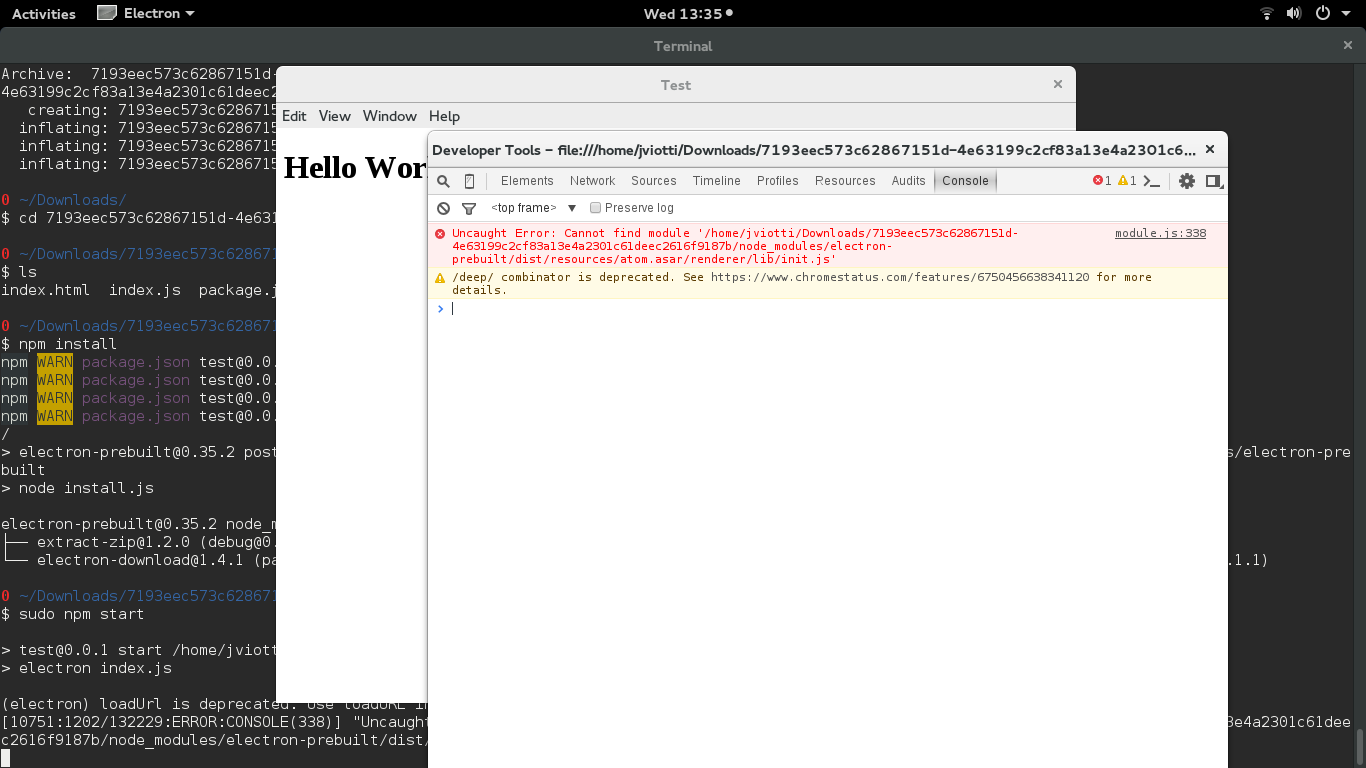Fixing a baffling issue when running Electron as root in GNU/Linux
TL;DR: This article discusses a Chromium sandboxing permission error when executing an Electron application as root on GNU/Linux
I’m working on Etcher, a cross-platform Electron to flash operating systems images to removable drives.
The application needs to get write permissions over devices,
so we present a nice “elevation” dialog at the start of the
application to run the application as root.
This works great in OS X and Windows, however, we faced the following error on GNU/Linux:
Uncaught Error: Cannot find module '/home/jviotti/Projects/etcher/node_modules/electron-prebuilt/dist/resources/atom.asar/renderer/lib/init.js'
Notice that the bug only manifests itself when running an
Electron application on GNU/Linux as root.
This
file is in charge of exposing Electron’s public APIs,
exporting Node.js bindings to global, and generally
initialising the renderer context.
Failing to load this file means that we can’t
require() any modules nor do anything meaningful,
leading the app to a broken state.
We can check that this file exists by using the asar
command line utility tool:
asar list resources/atom.asar | grep /renderer/lib/init.js /renderer/lib/init.jsAfter diving into the Electron codebase, the root of the
error is file_.IsValid(), a utility
function from Chromium, which returns -1 on
atom.asar in atom/common/asar/archive.cc's Archive::Init().
After having a closer look at file.h, we see
there is a method
called error_details that returns
Error that seems to be what we’re looking
for:
// Returns the OS result of opening this file. Note that the way to verify
// the success of the operation is to use IsValid(), not this method:
// File file(path, flags);
// if (!file.IsValid())
// return;
Error error_details() const { return error_details_; }There is also a nice static
method to convert Error to
std::string:
// Converts an error value to a human-readable form. Used for logging.
static std::string ErrorToString(Error error);By combining these two functions, the error becomes
FILE_ERROR_ACCESS_DENIED.
Why access denied? We’re running the application as the superuser, who presumably has access to everything, and we don’t get the error when running the application as a normal user.
See the following output from running the application with some improved error logging:
$ sudo ./out/D/electron
33204
33204
(electron) loadUrl is deprecated. Use loadURL instead.
33204
-1
Archive is invalid: (FILE_ERROR_ACCESS_DENIED): /home/jviotti/electron-current/out/D/resources/atom.asar
-1
...
Archive is invalid: (FILE_ERROR_ACCESS_DENIED): /home/jviotti/electron-current/out/D/resources/atom.asar
-1
Archive is invalid: (FILE_ERROR_ACCESS_DENIED): /home/jviotti/electron-current/out/D/resources/atom.asar
[30652:0128/113606:ERROR:CONSOLE(340)] "Uncaught Error: Cannot find module '/home/jviotti/electron-current/out/D/resources/atom.asar/renderer/lib/init.js'", source: module.js (340)Notice that the operation succeds a couple of times before the “access denied” error.
After some experimentation with getuid(),
we can see the operation works from Electron’s main thread but
fails from any renderer threads.
Turns out Chromium drops all capabilities from renderer
threads with the capset
Linux system call, which makes sense from a security point
of view in the context of a web browser:
// See https://code.google.com/p/chromium/codesearch#chromium/src/sandbox/linux/services/credentials.cc&q=ForkAndDrop&sq=package:chromium&type=cs&l=325
pid_t Credentials::ForkAndDropCapabilitiesInChild() {
pid_t pid = fork();
if (pid != 0) {
return pid;
}
// Since we just forked, we are single threaded.
PCHECK(DropAllCapabilitiesOnCurrentThread());
return 0;
}Electron makes use of a project called libchromiumcontent,
which provides a shared library that includes Chromium and all
its dependencies. The project contains a set of
diff patches that are applied on top of Chromium’s
source during the build phase, which is a perfect place for the
fix.
See the submitted pull request containing the patch here: https://github.com/atom/libchromiumcontent/pull/180
The fix described above landed in Electron v0.36.8.